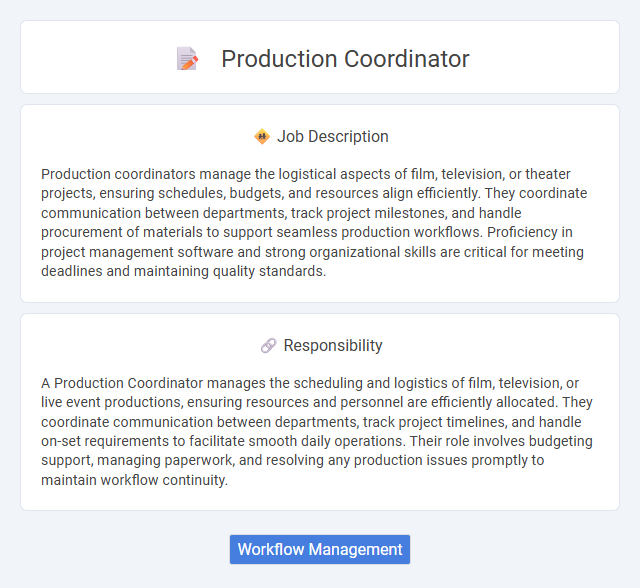
Production coordinators manage the logistical aspects of film, television, or theater projects, ensuring schedules, budgets, and resources align efficiently. They coordinate communication between departments, track project milestones, and handle procurement of materials to support seamless production workflows. Proficiency in project management software and strong organizational skills are critical for meeting deadlines and maintaining quality standards.
Individuals with strong organizational skills and the ability to manage multiple tasks simultaneously are likely to thrive as production coordinators. Those who handle high-pressure environments well and communicate effectively with diverse teams may find this role well-suited to their strengths. People who prefer structured workflows and enjoy problem-solving in dynamic settings might experience greater job satisfaction in production coordination.
Qualification
Production coordinators require strong organizational skills, proficiency in project management software, and excellent communication abilities to effectively liaise between departments. A bachelor's degree in film, communications, or business administration is often preferred, complemented by experience in scheduling, budgeting, and resource allocation. Knowledge of industry standards, deadlines, and problem-solving techniques ensures smooth production workflows and successful project completion.
Responsibility
A Production Coordinator manages the scheduling and logistics of film, television, or live event productions, ensuring resources and personnel are efficiently allocated. They coordinate communication between departments, track project timelines, and handle on-set requirements to facilitate smooth daily operations. Their role involves budgeting support, managing paperwork, and resolving any production issues promptly to maintain workflow continuity.
Benefit
A production coordinator likely benefits from gaining hands-on experience in managing schedules, resources, and communication flow, which enhances organizational skills. This role probably offers valuable opportunities to work closely with various departments, fostering strong teamwork and problem-solving abilities. Additionally, the job may provide exposure to the production industry, increasing the chance of career advancement in media, film, or manufacturing sectors.
Challenge
The role of a production coordinator probably involves managing a tight schedule and coordinating multiple teams to ensure smooth project execution. Balancing unexpected issues like equipment failures or resource shortages could pose frequent challenges. Effective communication and problem-solving skills are likely essential to navigate these dynamic situations successfully.
Career Advancement
A Production Coordinator plays a crucial role in managing schedules, resources, and communication between departments to ensure smooth production workflows. Gaining expertise in project management software and developing strong leadership skills can significantly enhance career advancement opportunities in the entertainment and manufacturing industries. Progression often leads to roles such as Production Manager, Operations Manager, or even Executive Producer, offering increased responsibility and higher earning potential.
Key Terms
Workflow Management
Production coordinators oversee workflow management by monitoring project timelines and coordinating resources to ensure seamless operations. They streamline communication between departments, track progress, and address any bottlenecks to maintain efficient production schedules. Their role is critical in optimizing workflows to meet deadlines and quality standards in various industries such as film, manufacturing, and advertising.
 kuljobs.com
kuljobs.com